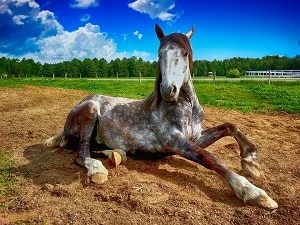How Much Does a Coggins Test Cost?
Last Updated on February 8, 2024
Written by CPA Alec Pow | Content Reviewed by ![]() CFA Alexander Popinker
CFA Alexander Popinker
The Coggins test is an important blood test that screens horses for Equine Infectious Anemia (EIA). But how much should you expect to pay for this critical equine health test? In this guide, we’ll break down the average cost of a Coggins test and what factors impact the price.
We’ll also share tips for managing costs without compromising your horse’s wellbeing. Read on to make sure your horse gets this vital test in a cost-effective way.
How Much Does a Coggins Test Cost?
The average cost of a Coggins test ranges from $20 to $60 per horse. This includes the farm call fee, sample collection, and laboratory analysis. However, pricing can vary widely based on your location, veterinary clinic rates, and additional services required.
Urban areas and specialized equine veterinarians often charge higher prices, with costs ranging from $45 to $100 per Coggins test. In rural locations with more large-animal vets, prices tend to be lower – generally $20 to $40 per test.
According to Bloomracing.com the cost of a Coggins test can range from $20 on the low side to $100 on the high side, depending on the location of the horse and distance to the lab. Rushing the results may incur an extra fee.
Users on Horseforum.com reported a Coggins test cost of $33.20 in 2018.
Ourimpact.oregonstate.edu writes that the average cost of having a horse tested for Coggins is about $125. However, through a collaboration with USDA-APHIS and Warm Springs Range, tribal members only pay $10 for the Coggins test.
Midmichiganequine.com listed the cost of a Coggins test for a new horse to the GVL system as $45.
According to Vmdl.missouri.edu, the price for a Coggins Test ELISA is listed as $8.75.
Regardless of price, the Coggins test is essential for monitoring your horse’s EIA status. EIA is an incurable and potentially fatal viral disease. Early detection through regular Coggins testing protects your horse’s health and prevents the spread to other equines.
Factors That Influence the Cost of Coggins Testing
Several key factors account for the variability in Coggins test pricing:
- Veterinary fees – The farm call rate to collect a blood sample from your horse and the general rates of your vet clinic significantly influence the total cost. Equine specialists charge higher prices.
- Laboratory charges – Fees for processing the bloodwork and analyzing it for EIA antibodies make up a portion of the total price. Most vets use external labs.
- Farm call – A farm call specifically for Coggins testing can cost $20 to $40 on its own. Some vets waive the call fee if they’re already visiting your property.
- Sample collection – Blood draw and sample handling expenses may be included in farm call pricing or charged separately ($5 to $20).
- Paperwork – Admin fees for generating health certificates with Coggins test results can range from $10 to $30.
- Insurance billing – If your horse insurance policy covers preventive testing, the vet may charge an additional fee for claim processing.
Regulations Affect the Cost of Coggins Testing
 State and federal regulations related to equine health certification impact Coggins testing prices in a few ways:
State and federal regulations related to equine health certification impact Coggins testing prices in a few ways:
- Interstate transport – A current Coggins test is required for crossing state lines. Testing enables necessary travel paperwork.
- Ownership transfer – Most states mandate a new Coggins test when selling a horse. This ensures the animal’s health status is verified.
- Show participation – Horses must have annual or semi-annual Coggins testing for entry to many competitions and events. More frequent testing increases costs.
- Liability – Vets may charge higher rates in states with strict penalties against owners for lapses in Coggins testing. The fees account for increased liability.
You might also like our articles about the cost of a horse, an Akhal-Teke horse, and the price of horse teeth floating.
While inconvenient, these regulations ultimately aim to protect equine health through consistent, widespread testing. This helps limit the spread of EIA.
How to Reduce Expenses for Coggins Testing
To get this vital blood test in a cost-effective manner, horse owners can:
- Time with routine vet visits – Schedule the Coggins test when your vet is already coming for vaccines or dental work. You can avoid extra farm call fees.
- Request price estimates – Get quotes from a few trusted vets to compare rates. But don’t sacrifice quality to save money.
- Inquire about test package pricing – Many clinics offer bundled pricing on services like vaccines and Coggins testing.
- Use your state lab – State veterinary diagnostic labs often have the lowest rates since they process high testing volumes.
- Pay attention to timing – Try to spread out annual Coggins tests across your horses. This prevents vet visits just for blood draws.
- Have a herd test – Testing multiple horses at once saves on farm calls and paperwork costs.
- Consider 3-year testing – In some states, low-risk adult horses can be tested every 3 years rather than annually to reduce frequency.
Conclusion
Regular Coggins virus testing provides invaluable insight into your horse’s well-being and reduces the population’s risk of EIA. While the price varies, focus on choosing a vet you trust to perform this test and budgeting wisely for this critical bloodwork.
With some strategic planning, you can keep costs in check without sacrificing safety. Your horse’s good health is always worth the investment.
Frequently Asked Questions
How common is a positive Coggins test result?
Thankfully, positive Coggins test results are quite rare. According to the American Association of Equine Practitioners (AAEP), the incidence of EIA infection in horses in the United States was only 0.02% in 2021.
Out of approximately 3 million tested horses, 624 were reported with positive results. The low rate is attributed to widespread annual testing and strict quarantines of infected animals. Consistently monitoring horse populations with Coggins testing helps maintain the low prevalence of this serious equine disease.
How often should my horse get a Coggins test?
The AAEP recommends annual Coggins testing for all horses to screen for EIA. More frequent testing every 6-12 months may be needed in some situations:
- Horses traveling frequently across state lines
- Horses stabled or pastured near positive cases
- Horses exposed to fly bites early/late in the year
- Horses participating in events requiring semi-annual testing
Adult horses in low-risk settings may qualify for testing every 2-3 years rather than annually. Discuss the ideal Coggins testing schedule with your veterinarian based on your horse’s individual disease risk profile and diagnosis history.
Is there a cure if a horse tests positive on the Coggins test?
Unfortunately, there is currently no approved treatment or vaccine for EIA in horses. If a horse tests positive for EIA on the Coggins test, the only recommended course of action is humane euthanasia or strict lifelong quarantine.
Infected horses must be isolated at least 200 yards from other equines to prevent viral spread by flies. Quarantined horses should have annual Coggins retesting.
While infected horses may have mild chronic signs, EIA often progresses to a fatal acute form of the disease. Swift euthanasia is generally the most humane and prudent option for horses that test Coggins positive.


Leave a Reply
Want to join the discussion?Feel free to contribute!